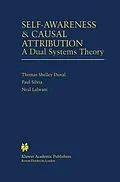Self-awareness - the ability to recognize one's existence - is one of the most important variables in psychology. Without self-awareness, people would be unable to self-reflect, recognize differences between the self and others, or compare themselves with internalized standards. Social, clinical, and personality psychologists have recognized the significance of self-awareness in human functioning, and have conducted much research on how it participates in everyday life and in psychological dysfunctions. Self-Awareness & Causal Attribution: A Dual-Systems Theory presents a new theory of how self-awareness affects thought, feeling, and action. Based on experimental social-psychological research, the authors describe how several interacting cognitive systems determine the links between self-awareness and organized activity. This theory addresses when people become self-focused, how people internalize and change personal standards, when people approach or avoid troubling situations, and the nature of self-evaluation. Special emphasis is given to causal attribution, the process of perceiving causality. Self-Awareness & Causal Attribution will be useful to social, clinical, and personality psychologists, as well as to anyone interested in how the self relates to motivation and emotion.
Inhalt
Preface. 1. Introduction & Overview. 2. Self & Self-Focused Attention. 3. Standards of Correctness. 4. Dynamics of the Comparison System. 5. Causal Attribution. 6. Intersecting the Comparison & Attribution Systems. 7. Evaluation & Behavior. 8. Dispositional Self-Awareness. 9. Effects of Self-Awareness on Affect. 10. Effects of Affect on Self-Awareness. 11. Evaluating Other Theories. References. Author Index. Subject Index.
